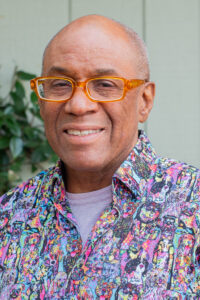Rev. Sherman Z. Logan, Jr.
Take On Faith – October 9, 2021
The Rev. Sherman Z. Logan, Executive Minister of First Unitarian Universalist of Richmond, VA was the guest on Take On Faith. He joined host, Xolani Kacela, for a far-ranging conversation about his unique role at FUURV. They also discussed his role as a board member of the UUA.
From Guest’s Church Website:
History of First UU RVA
THE ROOTS of liberal religion in Richmond, Virginia began early in the 19th Century when missionary circuit riders drifted in from the northeastern states spreading a new religious message. In 1830 Rev. John B. Dods spent six months in the city, organizing the first joint denomination of Unitarians and Universalists.
In 1831, their new meeting house was dedicated as the First Independent Christian Church of Richmond and John B Pitkin was the first minister to be installed by representatives from both faiths. The unconventional views of Christianity espoused by Rev. Pitkin attracted Richmond’s young intellectuals and businessmen.
More History
Over the next 30 years the church struggled with the ever present financial problems, a succession of transient ministers and the conflict of how to justify their position as a Christian Church. In 1862 the society’s minister, Rev. Alden Bosserman, was arrested in a “sweep” by Richmond’s Confederate Administration along with several well known Unionist Richmond merchants. They were suspected to be operating a ‘Union Underground’ designed to move Union soldiers caught behind the lines back into the North and assist occasional slave runaways.
Bosserman, along with Franklin Stearns, Burnham Wardwell, G. W. Frosst and Charles Palmer, was lodged in a slave jail designated for political prisoners awaiting their court hearing; former U.S. Senator, John Minor Botts, spent two months on the second floor of Lumpkin’s slave jail with a view of Shockoe Bottom’s factories through its barred windows.
The Richmond Dispatch (04/03/1862) lists Rev. Bosserman among Castle Godwin’s prisoners. His congregation, suspected to be an abolitionist front, continued to live with the indignity of the smear tactics aroused by their leader’s arrest for treason and a hostile community that took advantage of any opportunity to misrepresent their beliefs. After five months in prison, living under deplorable wartime conditions, Rev. Bosserman was released as part of a prisoner exchange.
Virginia’s secession from the Union proved to be the death-knell for the church on Mayo Street. As the war continued, the exceptional prosperity of the city disappeared under the strain of the political situation. Slave discontent turned into rebellion, an embargo had closed the city’s port, businesses began to fail and banks suspended specie payment. The weather was bitterly cold, cholera was rampant and there were food riots. Without leadership or the means to meet their financial obligations, the church disbanded officially in 1875.
RE-ESTABLISHMENT began with Sunday night meetings in the home of D.R. Wilson. At first, it was just a few friends getting together to read liberal literature and share their religious ideas. As more people joined the group, the American Unitarian Association (A.U.A.) initiated a mission effort. Early in 1893 Rev. George L. Chaney came to Richmond and began holding services in Belvidere Hall. A Women’s Alliance and a Sunday school were organized and the congregation grew under Rev. Chaney’s leadership. On December 31, 1893 eighteen people stepped forward to sign the Bond of Union that would formally create the First Unitarian Church of Richmond.


Leave a Reply